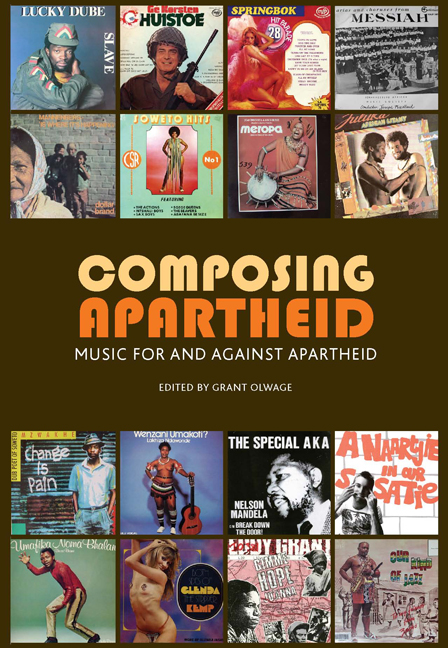Book contents
- Frontmatter
- Dedication
- Contents
- Acknowledgements
- Introduction
- Chapter 1 Back to the Future? Idioms of ‘displaced time’ in South African composition
- Chapter 2 Apartheid's Musical Signs: Reflections on black choralism, modernity and race-ethnicity in the segregation era
- Chapter 3 Discomposing Apartheid's Story: Who owns Handel?
- Chapter 4 Kwela's White Audiences: The politics of pleasure and identification in the early apartheid period
- Chapter 5 Popular Music and Negotiating Whiteness in Apartheid South Africa
- Chapter 6 Packaging Desires: Album covers and the presentation of apartheid
- Chapter 7 Musical Echoes: Composing a past in/for South African jazz
- Chapter 8 Singing Against Apartheid: ANC cultural groups and the international anti-apartheid struggle
- Chapter 9 ‘Nkosi Sikelel' iAfrika’: Stories of an African anthem
- Chapter 10 Whose ‘White Man Sleeps’ Aesthetics? and politics in the early work of Kevin Volans
- Chapter 11 State of Contention: Recomposing apartheid at Pretoria's State Theatre, 1990–1994. A personal recollection
- Chapter 12 Decomposing Apartheid: Things come together
- Chapter 13 Arnold van Wyk's Hands
- Contributors
- Index
Chapter 13 - Arnold van Wyk's Hands
Published online by Cambridge University Press: 20 April 2018
- Frontmatter
- Dedication
- Contents
- Acknowledgements
- Introduction
- Chapter 1 Back to the Future? Idioms of ‘displaced time’ in South African composition
- Chapter 2 Apartheid's Musical Signs: Reflections on black choralism, modernity and race-ethnicity in the segregation era
- Chapter 3 Discomposing Apartheid's Story: Who owns Handel?
- Chapter 4 Kwela's White Audiences: The politics of pleasure and identification in the early apartheid period
- Chapter 5 Popular Music and Negotiating Whiteness in Apartheid South Africa
- Chapter 6 Packaging Desires: Album covers and the presentation of apartheid
- Chapter 7 Musical Echoes: Composing a past in/for South African jazz
- Chapter 8 Singing Against Apartheid: ANC cultural groups and the international anti-apartheid struggle
- Chapter 9 ‘Nkosi Sikelel' iAfrika’: Stories of an African anthem
- Chapter 10 Whose ‘White Man Sleeps’ Aesthetics? and politics in the early work of Kevin Volans
- Chapter 11 State of Contention: Recomposing apartheid at Pretoria's State Theatre, 1990–1994. A personal recollection
- Chapter 12 Decomposing Apartheid: Things come together
- Chapter 13 Arnold van Wyk's Hands
- Contributors
- Index
Summary
It does not seem to me, Austerlitz added, that we understand the laws governing the return of the past, but I feel more and more as if time did not exist at all, only various spaces interlocking according to the rules of a higher form of stereometry, between which the living and the dead can move back and forth as they like, and the longer I think about it the more it seems to me that we who are still alive are unreal in the eyes of the dead, that only occasionally, in certain lights and atmospheric conditions, do we appear in their field of vision (WG Sebald, Austerlitz, 2002: 185).
When I was asked to participate in the conference from which this book was born, my initial reaction, after giving it some careful thought, was to decline the invitation. I told myself: I am too busy to do this. But in reality, I was discomforted by the conference theme and the sentiment that seemed to drive it. A press release of 30 April 2004 by NewMusicSA, under whose auspices the conference was organised, left little doubt of what that sentiment was. In this press release, the South African composer Michael Blake (then president of NewMusicSA) was quoted as saying:
While everyone in music and the arts has been looking at the achievements of the past 10 years, NewMusicSA felt it was a good time to reflect on composition in the years of apartheid when white composers – the current whingers! – were having a pretty good time, thanks to their great patrons the old National Party, the Broederbond, the SABC and Anton Hartman, and the apartheid system itself. Never before (or since) had so much mediocrity reached such heights …
It was difficult to see how open and explorative the conference could be in the face of such provocative and simplistic views. Nor was it clear how research on white composers who lived during apartheid (in my case Arnold van Wyk) could be presented unless it accepted (even, or especially, in opposing) this already established master-narrative of apartheid complicity and aggrandisement.
But my reservations went deeper still. I was reluctant to prepare yet another academic paper in English at this time.
- Type
- Chapter
- Information
- Composing ApartheidMusic for and against apartheid, pp. 281 - 300Publisher: Wits University PressPrint publication year: 2008



